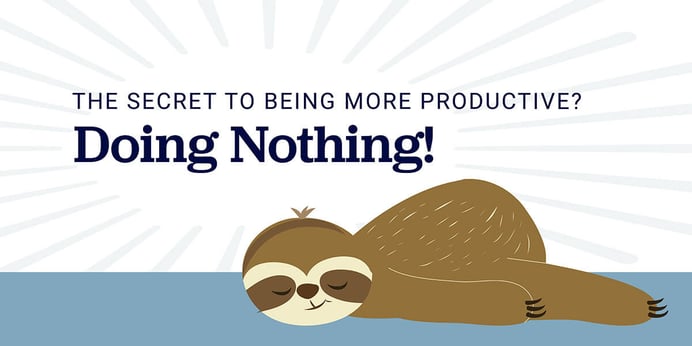
Niksen, Being Idle. Whatever you want to call it, slacking off makes you more productive and more creative. If this seems too good to be true, read on.
Now more than ever before, our work and home life are intertwined. For the past year-plus, many of us have been working remotely and for some organizations, there’s no plan to return to the office. Fortune 500 companies like Target have given up their swanky downtown Minneapolis office spaces because they’ve determined that they don’t really need a physical space any longer.

Most of us working remotely will never return to working at the office 100% of the time like the old days. This means that there’s no longer a marked distinction between home and work life. Gone are the days of the 5 o’clock whistle.
While working from home is pretty awesome, there are some negatives. Because there’s no clear distinction, it’s tough to stop working at the end of the day and start relaxing. Furthermore, working remotely means there’s no longer that commute time when you can put work behind you, decompress, and get into “being at home” mode.
On top of all this, our culture values productivity to a hyper degree. Consider the last time you browsed your local bookstore. There are rows and rows of books showing us how to be more productive and get more done. Our culture values being productive 24/7. Some people have even gone so far as to give our obsession with productivity the label "Productivity Porn." We’re a “more” culture where we constantly keep adding more without taking anything away.
Some of us feel guilty when we’re not productive. I grew up in a family with a strong work ethic. This was a point of pride for us. Sleeping in just wasn’t done. In my family, Saturdays were for music lessons and youth symphony rehearsals. In other words, doing stuff. I was up early and busy all day. I’m not saying that one way is better than the other but I think my background and my family’s propensity for “doing” makes it difficult for me to do nothing. Chances are, many of you feel the same way.
Early on in our marriage, David used to tell me, “you’re a do-er, I’m a be-er.” I just kind of laughed. He was and still is good about cultivating a rest ethic and taking time to recharge. He even gave me this book which I haven’t had time to read yet. The irony! (Now that I put this out there, I have to make time to read it).
For me, I didn’t understand how vital doing nothing was until recently. Like many of you, I hit the pandemic wall and it increasingly became more difficult to do good work. It was like I was trying to draw with a dull pencil.
I needed to rest and recharge. I took some time to dig in the dirt, play with my family and friends, listen to music, and cook. Guess what? When I returned to work, I felt recharged, more creative, and even a little happier.

It turns out slacking off is good for you! The Dutch (don’t you just love the Dutch?) have a word for it. Niksen is defined as the practice of doing nothing as a means of relieving stress; idle activity, as staring into the trees or listening to music, with no purpose other than relaxation.
When you take time to recharge you’re not only more productive, it boosts your attention and fosters creativity.
So, how can you go from being a busy bee to doing nothing? For many of us, it’s not that simple.
10 Tips to Help You Embrace Niksen
- Do something completely different. For example, if you work at a computer all day, playing video games won’t recharge you.
- Push through the discomfort. If you’re not used to being idle, it’s going to feel a bit strange and there will be discomfort. If you stick with it, however, it will get easier.
- Set regular time aside for doing nothing. While scheduling time to do nothing may seem like an oxymoron, it will help you create a habit that sticks.
- Enlist routine activities that keep your body busy but not your mind. Regular household chores like doing the dishes or sweeping the floor are perfect.
- Don’t be so hard on yourself.
- Listen to music.
- Look at art.
- Stare out the window. I’m serious!
- Get outside and be in nature. Taking walks is a great way to let your mind recharge.
- Start a meditation practice.
With our world getting faster by the minute, taking time out to do nothing is vital. Send me a message if you'd like to join me in making a concerted effort to be idle a bit more this summer. You can thank me later for the productivity boost.